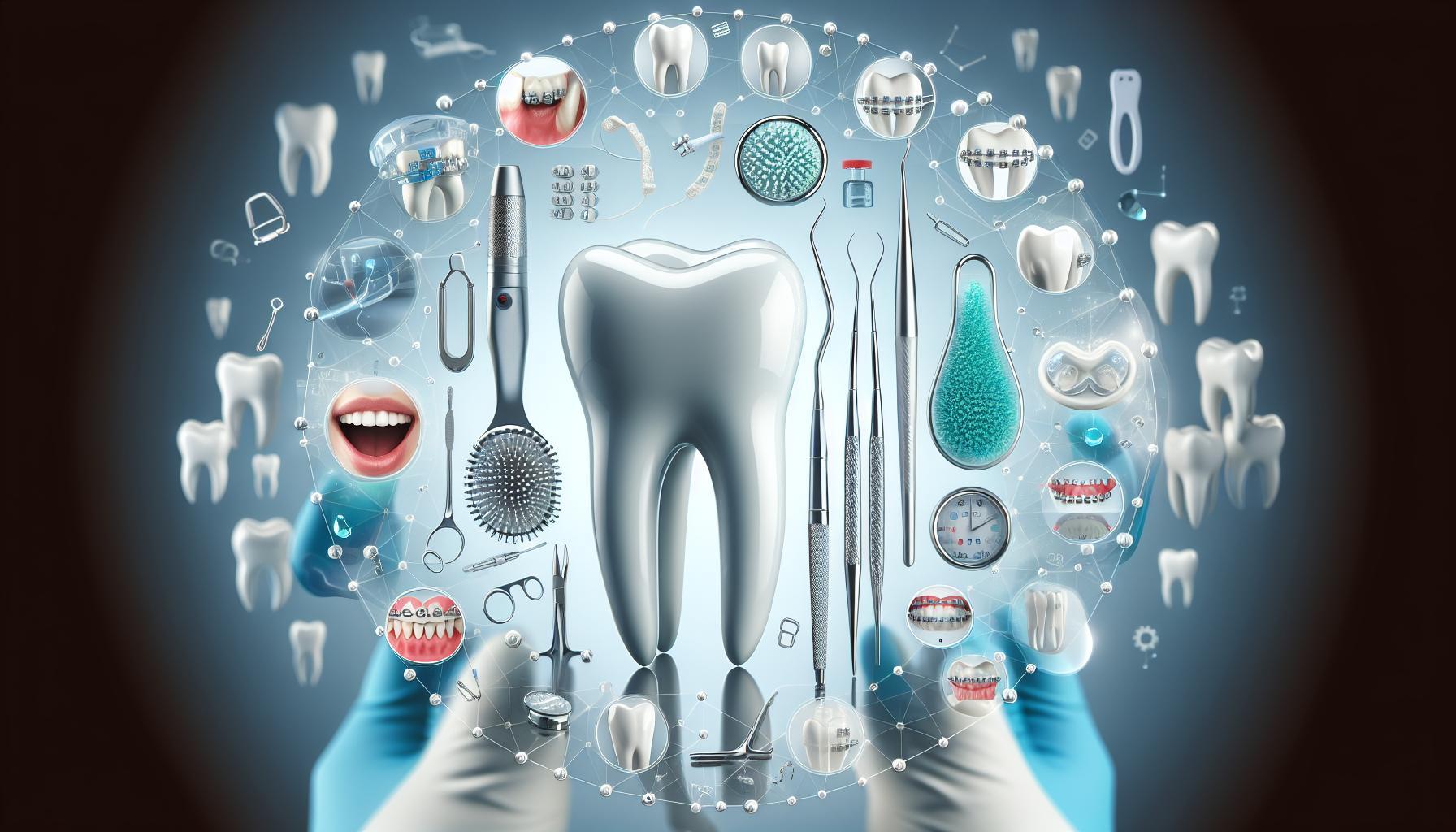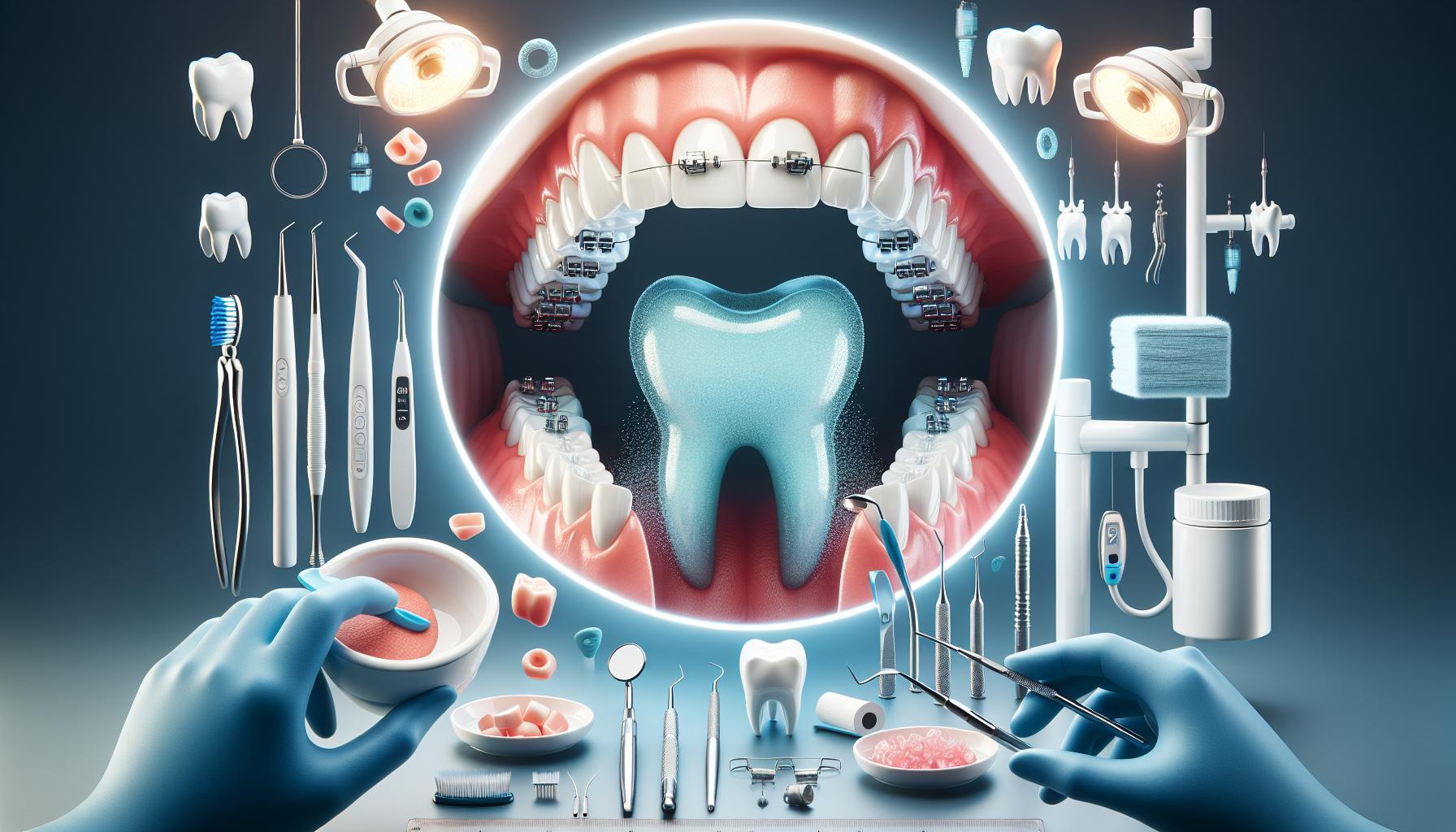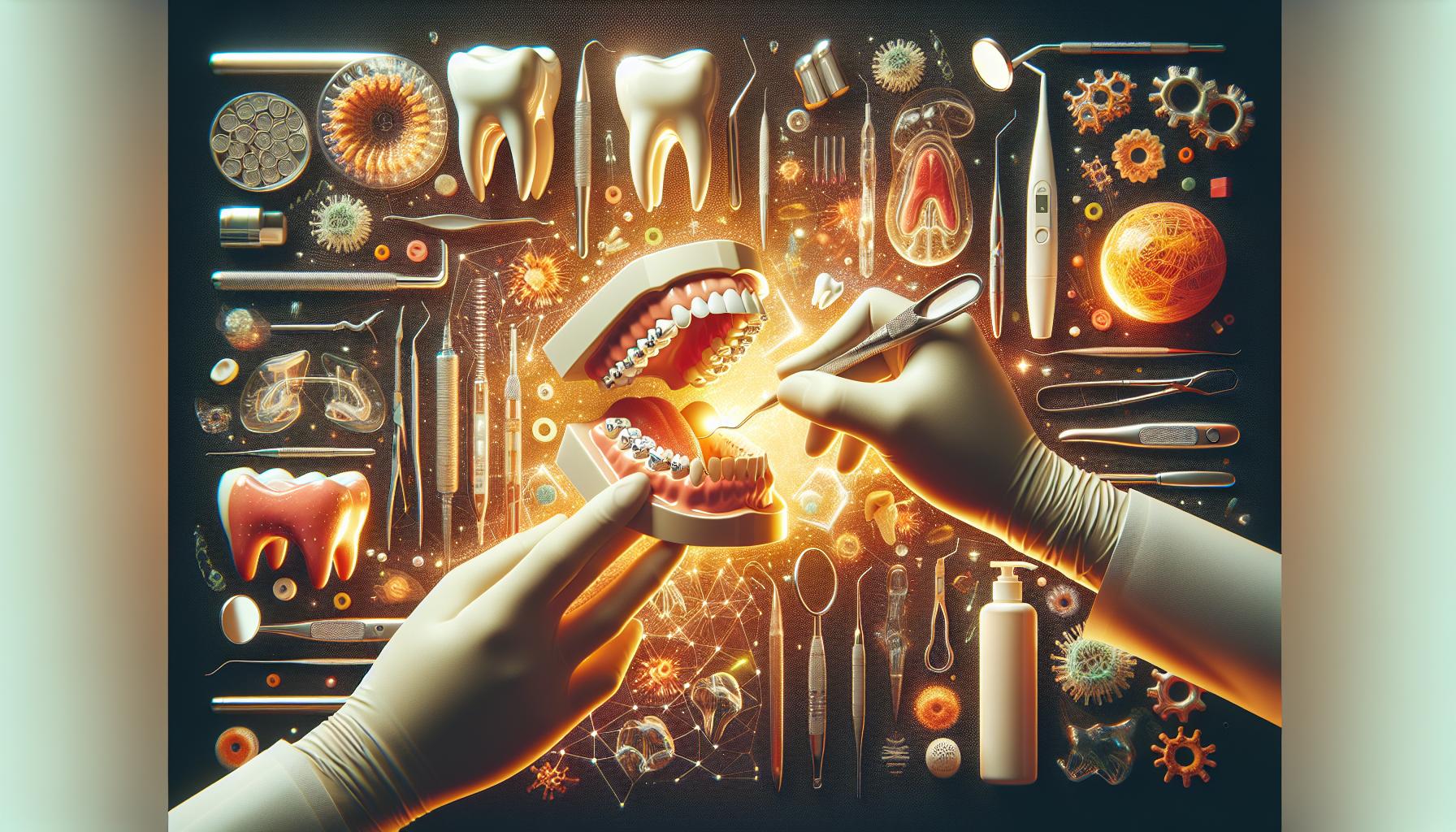
When it comes to dental health, many people wonder how much their oral habits are visible to their dentist. From concerns about potential judgment to questions about oral hygiene, it’s crucial to understand what dental professionals can actually detect. This discussion sheds light on common myths and emphasizes the importance of open communication for maintaining overall oral health.
Understanding the Connection: Oral Sex and Dental Health
Exploring the Link Between Oral Sex and Dental Health
Did you know that engaging in oral sex can have profound implications for your oral health? While pleasure is often the primary focus, understanding the underlying dental risks is crucial. Oral sex can act as a conduit for various infections, including those that affect your gums and teeth.This connection prompts many to wonder, Do dentists know if you give oral? The answer encompasses a blend of health risks and preventative measures that can be taken to maintain optimal dental hygiene.
One major concern is the increased risk of developing gingivitis. When proper oral hygiene is neglected, the bacteria involved in sexual activities can lead to inflamed gums and further complications, including bad breath, known as halitosis. According to dental experts, maintaining good oral hygiene such as regular brushing and flossing, especially before and after engaging in oral sex, can substantially reduce this risk [[2]].
Along with gum health, it’s essential to acknowledge that the oral cavity serves as an entry point for various pathogens. Conditions transmitted via oral sex can manifest not only in the mouth but also affect other parts of the body.As a notable example,the transmission of infections can occur,complicating dental health over time. Implementing safe sex practices,such as using dental dams or condoms during oral activities,can be effective in reducing these risks.
| Risk factor | Potential Impact on Oral Health | Preventative Measures |
|---|---|---|
| Gingivitis | Inflamed and bleeding gums | Regular brushing,flossing,and dental check-ups |
| Halitosis | Persistent bad breath | Good oral hygiene; mouthwash |
| Infections | Oral lesions or systemic sickness | Use of protection during oral sex |
While casual encounters may seem harmless,understanding how oral sex can intertwine with dental health is essential. Engaging in Do Dentists Know If You Give Oral? Reddit’s Top Questions Answered reveals how proactive measures and awareness can pave the way for maintaining both oral and overall health. Remember, your mouth is not just a source of enjoyment—it’s an integral part of your health that deserves equal attention.
What Dentists Really Look For During Your Check-Up
When visiting the dentist for a routine check-up, many patients wonder about the various aspects of dental health that their dentist evaluates. A common question is weather healthcare professionals can discern issues related to certain activities, such as giving oral sex. While this might seem like a specific concern, dental exams encompass a much broader range of assessments crucial for maintaining oral health.
What Dentists Examine During Your Check-Up
During a dental check-up, your dentist will conduct a thorough examination addressing several key factors that contribute to your overall dental health. Here’s what they typically look for:
- Dental Hygiene: The dentist will assess your oral hygiene practices, including plaque buildup on your teeth. this provides insights into how well you’re managing at-home care.
- Gum Health: healthy gums are pale pink and firm. Dentists check for signs of gum disease, such as redness, swelling, or bleeding.
- Cavities and Decay: Using tools such as dental explorers and X-rays, dentists identify decay and cavities that may not be visible to the naked eye.
- Oral Cancer Warning Signs: Your dentist will look for unusual lumps, sores, or discolorations in the mouth, which could indicate oral cancer.
- Dental Alignment: Proper alignment of teeth affects chewing, speaking, and oral comfort. Any irregularities may require orthodontic consultation.
Connection to Lifestyle Choices
the question “Do dentists know if you give oral?” may stem from concerns related to oral health repercussions tied to certain activities. Engaging in oral sex can lead to specific health issues, such as the transmission of sexually transmitted infections (STIs) which might manifest orally, yet these concerns are typically subtle and may not be directly detectable during a routine check-up. Dentists can observe signs or symptoms arising from such activities, such as lesions or unusual tissue changes, and they may ask probing questions about your oral health habits and lifestyle choices.
For patients,it’s essential to engage in open dialog with your dentist about all aspects of your health,including any specific concerns related to oral health impacts from sexual activities. This allows for better tailored advice and treatment options.
Practical Steps to Maintain Oral health
To ensure you maintain optimal oral health between check-ups, consider the following practical steps:
| Tip | Description |
|---|---|
| Regular Brushing | Brush at least twice a day using fluoride toothpaste. |
| Floss Daily | Flossing removes plaque and prevents gum disease. |
| Stay Hydrated | Proper hydration can help maintain saliva levels, which is crucial for oral health. |
| Lifestyle Choices | Avoid tobacco and limit alcohol consumption, which can impact your oral health negatively. |
| Regular Dental Visits | Visit your dentist at least once a year for a professional evaluation. |
while dentists employ various techniques to evaluate your oral health during a check-up, any links between specific activities and oral conditions can require proactive discussion from patients. keeping open lines of communication with your dentist will enhance both your experience and the maintenance of your overall dental health.
Common Oral Health Issues Linked to Oral Activities
Understanding Oral Health Issues Connected to Oral Activities
Engaging in oral activities can have a range of effects on oral health. While these practices are often considered normal in many cultures, they can sometimes lead to specific dental issues if proper care isn’t taken. It’s crucial to be aware of these potential problems, especially when reading through popular discussions like ‘Do Dentists Know If You give Oral? Reddit’s Top Questions Answered’.
Some common oral health concerns linked to oral activities include:
- Gum disease: Bacteria from the mouth can easily transfer between partners, which can lead to the development of gum disease. This condition is characterized by inflammation of the gums, which, if left untreated, can result in tooth loss.
- Tooth Sensitivity: Engaging in oral activities may sometimes contribute to enamel erosion, leading to increased tooth sensitivity. This can be quite uncomfortable and can require dental intervention.
- Increased Risk of STIs: Oral sex can transmit sexually transmitted infections (stis) such as herpes, gonorrhea, and syphilis. these infections can also manifest in the oral cavity, leading to further complications.
- Oral Lesions: Friction and trauma during oral activities can cause small cuts and lesions in the mouth, which may become infected.
Preventive Measures for Maintaining Oral Health
To minimize the risks associated with oral activities, individuals should consider adopting a few best practices:
- Maintain Oral Hygiene: Regular brushing, flossing, and routine dental check-ups are essential.Keeping your teeth and gums healthy can significantly reduce the risk of gum disease and other oral health issues.
- Use Barriers: Using protection, such as flavored condoms or dental dams, can definitely help prevent the transmission of STIs during oral activities.
- Stay Hydrated: Keeping your mouth moist is crucial. Dryness can increase the likelihood of micro-tears in the oral mucosa, making it a breeding ground for infections.
- Be Aware of Symptoms: regularly monitor your mouth for any unusual symptoms, such as persistent sores or sensitivity. Early detection can lead to timely treatment.
The discussion around “Do Dentists Know If You Give Oral? Reddit’s Top Questions Answered” raises various questions about oral health that are essential for individuals partaking in these activities. Understanding the implications can not only foster better habits but also lead to healthier interactions with partners.
Signs that Your Oral Habits Might Be Impacting Your Teeth
Many people may not realize that their oral habits could be having a significant impact on their dental health. From the way we chew our food to the way we maintain our oral hygiene, every small act contributes to the overall health of our teeth and gums. Understanding the signs that suggest your oral habits might be demanding attention can definitely help you take action before more serious problems develop.
common Signs of Negative Impact
There are several tell-tale indicators that your daily routines could be adversely affecting your teeth. These signs frequently enough manifest subtly at first but can lead to substantial oral health issues over time. Here are a few signs to watch for:
- Tooth Sensitivity: If you experience discomfort or pain when consuming hot or cold foods, it may signify enamel erosion or a cavity.
- Frequent Cavities: Regular visits to the dentist showing multiple cavities can indicate inadequate oral hygiene practices.
- Gum Recession: Noticing that your gums are pulling away from your teeth could mean you’re brushing too hard or not effectively cleaning your mouth.
- Chipped or Cracked Teeth: Engaging in habits like nail biting, chewing on ice, or grinding your teeth can lead to structural damage over time.
Recognizing Behavioral Patterns
In assessing whether your oral habits might be problematic, reflect on your daily routines. Here are some behaviors worth examining:
- Are you a Late-Night Snacker? Consuming sugary snacks while relaxing at night can foster conditions for cavities, particularly if brushing your teeth isn’t part of your routine immediately afterward.
- Do You Drink Sugary Beverages? Soda and fruit juices are notoriously high in sugar and acid,both of which can erode enamel if consumed excessively.
- Do You Skip Dental Visits? Regular dental check-ups are crucial for identifying potential problems early. Neglecting professional cleanings can lead to more severe issues that might be avoided.
Take Action for Better Oral Health
If you recognize any of these signs or habits in your life,it’s crucial to take steps toward better oral health. Here are some practical tips to help:
- Brush Twice Daily: Ensure you’re brushing for at least two minutes each time, using fluoride toothpaste.
- Floss Daily: flossing removes plaque and food particles between teeth, where your toothbrush may not reach.
- Limit Sugary Snacks and Drinks: Opt for healthier alternatives and always rinse your mouth with water after consuming sugary items.
- Visit Your Dentist Regularly: Aim for at least two visits a year for professional check-ups and cleanings.
By being vigilant about your oral health and recognizing these signs, you can maintain a luminous smile and reduce the risk of long-term damage. For more insights about oral health habits, check out discussions surrounding how oral practices relate to overall dental care and management strategies commonly shared in platforms targeting queries like “Do Dentists Know If You Give Oral? Reddit’s Top Questions Answered.” Taking these steps today can pave the way for a healthier tomorrow.
Expert Tips for Maintaining Oral Hygiene After Oral Sex
Engaging in oral sex can raise various concerns about oral hygiene, particularly regarding the transmission of bacteria and viruses. It’s a common misconception that regular brushing and flossing are sufficient for maintaining oral health in these situations.However, additional care can enhance hygiene and reduce potential risks.
- Rinse Immediately: After oral sex, it’s crucial to rinse your mouth with water to remove any residual bodily fluids. This not only clears the mouth but also helps in reducing bacterial growth.
- Use Mouthwash: Following a rinse with water,consider using an antibacterial mouthwash. this can effectively kill bacteria that may linger and help prevent infections, contributing to an overall healthier oral environment [[2](https://www.cdc.gov/oral-health/prevention/oral-health-tips-for-adults.html)].
- Brush Your Teeth: Wait for at least 30 minutes after oral sex before brushing your teeth. This is particularly crucial if you’ve encountered acidic bodily fluids,as brushing immediately can wear down your enamel. When you’re ready, use a soft-bristled toothbrush with fluoride toothpaste and ensure that you brush gently but thoroughly [[3](https://my.clevelandclinic.org/health/treatments/16914-oral-hygiene)].
- Floss Properly: Flossing is an essential part of your oral hygiene routine, especially after oral sex.It helps remove plaque and food particles stuck between teeth, where a toothbrush might not reach. Flossing at least once a day can maintain gum health and prevent the development of gum disease [[1](https://www.colgate.com/en-us/oral-health/brushing-and-flossing/ten-dental-hygiene-tips-for-a-more-thorough-clean)].
By adopting these simple yet effective practices,you can significantly improve your oral hygiene following oral sex. Maintaining these habits contributes to reducing oral health risks and ensures that your mouth stays clean and healthy. Awareness and proactive care are key components of a solid hygiene routine. Remember, if you have specific concerns about your oral health or practices, consulting a dentist can provide personalized guidance that caters to your needs.
preventing Dental Problems: Best Practices for Oral care
Oral health plays a crucial role in overall well-being, transcending mere aesthetics to impact general health conditions. Maintaining a robust oral hygiene routine can prevent dental issues such as cavities, gum disease, and bad breath. whether you’re contemplating specific questions about dental care, like those discussed in “Do Dentists Know If You Give Oral? Reddit’s Top Questions Answered,” understanding best practices for oral care is foundational in promoting a healthy mouth.
Essential Daily Habits
To ensure your smile remains bright and healthy, incorporating effective habits into your daily routine is essential. Here are some best practices to follow:
- Brush Your Teeth Twice Daily: Use a fluoride toothpaste and a soft-bristled toothbrush to brush for at least two minutes each time.
- Floss Regularly: Clean between your teeth at least once a day to remove plaque and food particles that a toothbrush can’t reach.
- Rinse with Mouthwash: Using an antimicrobial mouthwash can help reduce plaque and fight gum disease.
Establishing these habits not only contributes to a clean mouth but also addresses some of the concerns discussed in the context of oral sexual health in forums like Reddit. Proper hygiene can minimize the risk of transferring additional bacteria during intimate encounters.
Routine Dental Visits
Another cornerstone of dental health is maintaining regular check-ups with your dentist. Visiting the dentist at least twice a year allows for professional cleaning and timely interventions for any potential issues. During these appointments, dentists can identify early signs of trouble that might otherwise go unnoticed, such as early-stage gum disease or cavities.
Additionally, your dentist can provide personalized advice tailored to your specific needs, which is especially helpful for individuals engaging in activities that may influence oral health, as mentioned in discussions such as “Do Dentists Know If You Give oral? Reddit’s Top Questions Answered.” Such as, they might suggest enhanced oral care measures if you frequently engage in practices that increase the risk of dental problems.
The Role of Nutrition
Diet significantly impacts oral health. Foods high in sugar can lead to an increase in cavities, while nutrient-rich foods support healthy gums and teeth. Aim to include:
- Fruits and vegetables high in fiber
- Dairy products for calcium
- Lean proteins to promote tissue repair
Quality nutrition enhances your body’s ability to fend off infections, which is particularly relevant when considering oral health during intimate moments. Ensure you balance your diet to support dental strength and resilience.
proactive oral care and hygiene practices help prevent dental problems, ensuring a healthy mouth while navigating discussions and questions around oral practices, as explored in “Do Dentists Know If You Give Oral? Reddit’s Top Questions Answered.” By following established guidelines, scheduling regular dentist visits, and maintaining a nutritious diet, you can safeguard your oral health effectively.
When to Seek Professional Help: dental Concerns and Oral Activity
When it comes to oral health, understanding when to seek professional help is crucial for maintaining optimal hygiene and addressing potential issues early. Dental concerns can arise from various activities,including those related to oral intimacy. Recognizing the signs that warrant a visit to the dentist can save you from more serious complications in the long run.
Recognizing Warning Signs
Certain symptoms should prompt you to seek professional dental care. Pay attention to the following warning signs:
- Persistent Pain: If you experience tooth pain that doesn’t subside, it’s a clear indication that something is amiss. This could be due to cavities or other underlying issues.
- Bleeding Gums: Frequent bleeding when brushing or flossing may signal gum disease, which requires prompt evaluation and treatment.
- Loose teeth: Adult teeth shouldn’t be loose. If this happens,it could indicate a serious dental problem that needs immediate attention.
- Chronic bad Breath: While occasional bad breath is common,persistent halitosis can be a sign of an infection or other oral issues.
These symptoms not only indicate potential issues stemming from everyday activities, such as giving oral, but they also reflect broader health concerns that could affect your overall well-being.
Consultation and Treatment
If you encounter any of these issues, consult a dentist without delay. According to experts, neglecting these signs can lead to more severe complications, ranging from tooth loss to systemic diseases. Routine dental check-ups are important even if you feel fine, as many oral health problems can develop without noticeable symptoms.
For more urgent concerns, especially related to oral activity and its impact on dental health, platforms like DentalChat can connect you with licensed dentists who can provide immediate advice and potential treatment options. They can address specific worries, including those about potential damage from oral practices and how to mitigate risks.
Building a Healthy Oral Routine
Prevention is always better than cure. Here are practical steps you can take to maintain a healthy oral environment:
- Daily Brushing and Flossing: Brush your teeth at least twice a day and floss daily to remove plaque and food particles.
- Regular Dental Visits: Ensure you schedule dental check-ups at least twice a year for professional cleaning and assessment.
- Stay Hydrated: Drinking plenty of water can help wash away food particles and reduce acidity in the mouth.
- Avoid Tobacco: Smoking or using tobacco products can exacerbate dental issues and lead to severe health consequences.
Understanding when to seek help is a vital aspect of maintaining your dental health. Addressing concerns early, whether they arise from casual activities or routine wear and tear, can lead to better health outcomes and preserve your smile for years to come.
Demystifying the Myths: What Dentists Wish You Knew About Oral Sex
When it comes to oral sex, many people are curious about its effects on dental health and whether dentists can really tell if someone engages in this intimate act. One common misconception is that the mouth and teeth are unaffected by such activities, leading to misconceptions about the potential risks involved. understanding the connection between oral sex and dental hygiene can definitely help demystify this topic and provide insights into maintaining optimal oral health.
The Reality of Oral Sex and Dental Health
Engaging in oral sex can indeed have implications for dental health. Here are several important points that dentists wish everyone understood:
- Increased Risk of Oral Infections: Oral sex can expose the mouth to bacteria and viruses that may lead to infections. Maintaining oral hygiene before and after is crucial.
- Cavities and Decay: While sugar is often blamed for cavities, bacteria can thrive in the mouth during oral sex. This can contribute to tooth decay if proper care is not taken.
- Bleeding Gums: If someone has pre-existing gum issues, oral sex may exacerbate these problems, leading to bleeding and potential infections.
Understanding these risks can help individuals take proactive steps in their oral care routine to minimize any negative effects.
What Can Be Done?
To maintain optimal oral health, here are some actionable steps you can integrate into your routine:
| Action | Description |
|---|---|
| Brush and Floss Regularly | Ensure you brush your teeth at least twice a day and floss daily to remove plaque and food particles. |
| Stay Hydrated | Drink plenty of water, which helps wash away bacteria and keeps your mouth moist. |
| Use Mouthwash | Incorporate an antimicrobial mouthwash to reduce bacteria in your mouth after sexual activities. |
| Regular Dental Check-ups | Schedule routine check-ups to monitor your oral health and address any emerging issues promptly. |
By taking these steps, individuals can mitigate the potential risks associated with oral sex and maintain a healthy mouth. Remember, it’s always a good idea to discuss your sexual health with your dentist during visits.
while engaging in oral sex may introduce certain risks, understanding these factors and implementing a solid oral hygiene routine can definitely help you navigate your dental health effectively. Whether you’re curious from a health perspective or simply seeking reassurance, being informed is key to maintaining both a satisfying sexual life and good oral health.
Frequently asked questions
Do Dentists Know If You Give Oral Sex?
Dentists are primarily focused on your oral health, and while they may not specifically ask about your sexual practices, they can sometimes gather hints based on the condition of your mouth.For instance, frequent oral sexual activity can lead to certain observable health issues, such as signs of sexually transmitted infections (STIs) or irritation in the oral cavity.Conditions like canker sores, gum disease, or unusual lesions might prompt a dentist to ask about your sexual health to better understand any potential underlying causes.
Even though dentists do not explicitly look for signs of oral sex, they are trained to notice anomalies in the mouth. If you’re concerned about privacy, it’s essential to remember that health professionals adhere to strict confidentiality guidelines. Ultimately, you should feel pleasant discussing any issues openly with your dentist. Maintaining transparent communication can only help in your treatment and oral health care.
What Signs Might a Dentist Notice Related to Oral Sex?
When performing oral examinations, dentists may observe various indicators that could suggest a person engages in oral sex. Common signs could include sores, lesions, or an increase in certain types of bacteria, which might lead to gum disease. For example,HIV and herpes can manifest through visible symptoms in the mouth,and dentists are trained to recognize such conditions.
Though, many factors can lead to similar oral symptoms, and thus these signs alone do not definitively indicate sexual activity. it’s important to remember that the dentist’s role is not to judge or pry, rather they seek to ensure your oral health is in good standing. Being mindful of your oral hygiene and health before visiting the dentist is always beneficial.
should You Tell Your Dentist About Your Oral Sexual Activity?
While it may feel awkward to discuss your sexual practices with your dentist, it can actually be quite beneficial. If you have experienced complications, such as pain, lesions, or infections, providing your dentist with this information can help them make more informed decisions about your treatment.The more learned your dentist is about your health, the better care they can provide.
Being open about your sexual health can lead to better preventive measures, such as regular screenings for STIs that might affect your mouth. Many patients worry about judgment, but it’s crucial to understand that health professionals are there to support and protect your well-being, not to pass judgment on your lifestyle choices.
Can Oral Sex Affect My Oral Health?
Yes, engaging in oral sex can have effects on your oral health. Some potential risks include transmitting infections or developing oral conditions such as gingivitis or other forms of periodontal disease due to the exchange of bacteria. It’s worth noting that certain STIs can also be transmitted through oral sex, perhaps leading to complications that may present symptoms in the mouth.
To mitigate these risks, practicing good oral hygiene is essential. Brushing twice a day,flossing daily,and using mouthwash can help maintain a healthy oral environment. If you engage in oral sex, consider scheduling regular dental check-ups to monitor your oral health and catch any potential issues early.
How can I Maintain Good Oral Hygiene If I Engage in Oral Sex?
Maintaining robust oral hygiene practices is vital, especially for those who engage in oral sex. Start with the basics by brushing your teeth at least twice daily, flossing, and using an antiseptic mouthwash regularly. It’s also advisable to keep your mouth well-hydrated and avoid any irritants like tobacco or excessive alcohol.
Additionally, consider using protection during oral sex, such as flavored dental dams or condoms, which can help reduce the risk of transmitting infections. Regular dental check-ups can also assist you in keeping your teeth and gums healthy while allowing your dentist to monitor for any potential concerns that arise from your sexual practices.
what Resources Are Available for Dental and Sexual Health?
There are many resources available to help individuals stay informed about both dental and sexual health. Organizations like the American Dental Association offer valuable guidelines for maintaining good dental hygiene.Moreover, websites like the world Health Association provide information on sexual health and hygiene practices that can protect your overall well-being.
Local health centers or clinics might also provide resources for regular testing and education on STIs,including how they can affect your oral health. It’s important to stay proactive about your health by utilizing these resources and consulting with professionals who can answer any questions or concerns you may have. Maintaining regular appointments with your healthcare providers ensures you receive extensive care tailored to your needs.
Concluding Remarks
Conclusion
In this article, we’ve tackled some of the most pressing questions about whether dentists can tell if you’ve engaged in oral sex. Here are the key points to remember:
- Oral Health Indicators: Dentists primarily focus on signs of oral health, such as gum health, cavities, and plaque buildup, which can give clues about a person’s personal habits.
- Communication is Key: Open dialogue with your dentist about your oral health can help address any concerns or questions without judgment.
- Be Informed: Understanding how different activities can impact your oral health encourages better habits and care.
We encourage you to stay proactive about your dental health by scheduling regular check-ups and maintaining good oral hygiene. For more insights, tips, and support on maintaining a healthy smile, don’t hesitate to explore our other articles or engage with our community. Your health and confidence matter, so let’s keep the conversation going!









